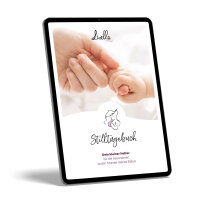Especially in the early weeks with a newborn, many parents wonder: “Why does my baby suddenly want to breastfeed constantly?” If your baby wants to feed repeatedly within a short period, with little or no breaks, you might be experiencing what is known as cluster feeding.
This intense phase can be exhausting but is entirely normal – and crucial for your baby's development. In this article, you'll learn what cluster feeding really means, why it happens, how to cope with it more easily, and when it’s time to seek support.
Table of content
What is Cluster Feeding?
Why Does Cluster Feeding Happen?
Common Myths and Misunderstandings
Quick Recap: Key Facts About Cluster Feeding
FAQ – Frequently Asked Questions About Cluster Feeding
What is Cluster Feeding?
Cluster feeding describes a feeding pattern where your baby wants to breastfeed very frequently over a few hours – often with short breaks in between.
It typically occurs at a particular time of day, most often in the late afternoon or evening.
Common behaviours during cluster feeding:
-
Several short nursing sessions close together
-
Little pause between feeds
-
Frequent sucking or latching without full feeds
-
Babies may appear restless or fussy between feeds
Important: Cluster feeding is normal and not usually a sign that your baby isn’t getting enough breast milk.
You can also read more about getting started with breastfeeding here: Breastfeeding: The First Days After Birth.

Why Does Cluster Feeding Happen?
Cluster feeding has both physiological and developmental reasons and is a natural part of your baby's growth.
From a physiological perspective, frequent feeding helps adjust the mother’s milk production to the increasing needs of the baby. The repeated nursing sends signals to the body to produce more milk – a vital response during your baby's growth.
Hormonal changes (such as fluctuating prolactin and oxytocin levels) in the early days also influence milk supply and feeding behaviour.
Developmentally, babies going through growth spurts or neurological milestones need more food and closeness. Breastfeeding not only nourishes but also soothes and strengthens the emotional bond between parent and child.
So the need for frequent feeding is not a “habit” – it’s a healthy sign of development.
Typical Signs and Timing
Cluster feeding often occurs:
-
In the evening or late afternoon
-
Between the second and sixth week of life
-
During growth spurts or developmental leaps
How long does a cluster feeding session last?
Usually, these sessions last for a few hours. Afterward, babies often sleep more deeply and for longer stretches.
Differentiating from Other Feeding Issues
If your baby feeds frequently but seems content and is gaining weight, cluster feeding is likely normal.
However, if your baby shows signs like high-pitched crying, poor weight gain, or other concerning symptoms, consult a healthcare professional.
You can find more information about feeding issues here: Low Milk Supply: Causes & Solutions.
Common Myths and Misunderstandings
Myth: Cluster feeding means I don’t have enough milk.
Fact: Frequent feeding actually helps ensure you produce enough milk to meet your baby’s needs.
Myth: The baby is just using the breast as a dummy (pacifier).
Fact: Sucking is essential for babies, serving not only for nourishment but also for emotional regulation.
Myth: Babies should be full after a few minutes – long feeds mean something is wrong.
Fact: Many babies naturally need longer or more frequent feeds, especially during cluster feeding periods.
Myth: Cluster feeding is a bad habit or means the baby isn’t sleeping properly.
Fact: Frequent feeding is normal and supports better sleep patterns and emotional security.
When to Seek Support
Contact a midwife, health visitor, or lactation consultant if:
-
Your baby has fewer wet nappies over 24 hours
-
Your baby isn’t gaining weight or is losing weight
-
You experience severe nipple pain during feeds
-
You’re concerned your baby isn’t satisfied after feeds

Quick Recap: Key Facts About Cluster Feeding
-
Cluster feeding is a natural, normal behaviour, especially in the early weeks.
-
It helps regulate milk supply and provides emotional comfort.
-
It can be exhausting, but usually passes within a few days.
-
Self-care and support are crucial to getting through this phase.
Remember: Cluster feeding is a positive sign that your baby is growing and developing exactly as they should!
FAQ – Frequently Asked Questions About Cluster Feeding
What exactly is cluster feeding?
Cluster feeding means your baby wants to breastfeed repeatedly in short intervals over several hours.
How long does cluster feeding last?
A session typically lasts a few hours, often in the evening, and can recur over several days during growth spurts.
Does cluster feeding mean I don't have enough milk?
No – it usually means your body is adjusting supply to meet your baby’s growing needs.
What can I do if I feel overwhelmed?
Prioritise rest, ask for help, and remind yourself that this phase will pass. Relaxation, good nutrition, and emotional support can make a big difference.
When should I seek professional help?
If you have severe pain, your baby is not gaining weight, or you feel unsure about feeding, a healthcare professional or lactation consultant can provide guidance.
Zusammenfassung: Die wichtigsten Punkte zu Clusterfeeding
- Clusterfeeding ist normales Stillverhalten – besonders in den ersten Wochen.
- Häufiges Stillen unterstützt die Anpassung der Milchproduktion und bietet Nähe und Trost.
- Die Phasen können anstrengend sein, sind aber in der Regel zeitlich begrenzt.
- Mit praktischen Tipps, Selbstfürsorge und der richtigen Unterstützung lässt sich diese intensive Zeit gut bewältigen.
Erinnere dich: Clusterfeeding ist ein Zeichen dafür, dass dein Baby genau das tut, was es braucht, um zu wachsen und sich zu entwickeln!
FAQ – Frequently Asked Questions About Cluster Feeding
What exactly is cluster feeding?
Cluster feeding means your baby wants to breastfeed repeatedly in short intervals over several hours.
How long does cluster feeding last?
A session typically lasts a few hours, often in the evening, and can recur over several days during growth spurts.
Does cluster feeding mean I don't have enough milk?
No – it usually means your body is adjusting supply to meet your baby’s growing needs.
What can I do if I feel overwhelmed?
Prioritise rest, ask for help, and remind yourself that this phase will pass. Relaxation, good nutrition, and emotional support can make a big difference.
When should I seek professional help?
If you have severe pain, your baby is not gaining weight, or you feel unsure about feeding, a healthcare professional or lactation consultant can provide guidance.
Verwendete Quellen
- https://www.gesund-ins-leben.de/fuer-fachkreise/bestens-unterstuetzt-durchs-1-lebensjahr/nachgefragt/still-marathon-was-bedeutet-clusterfeeding/
- https://www.elternleben.de/baby/stillen/clusterfeeding/
- https://www.vida-hebammen.ch/post/clusterfeeding
- https://www.big-direkt.de/de/gesund-leben/baby/clusterfeeding-ist-stillen-non-stop-normal
- https://www.eltern.de/familie-urlaub/ohr-nach-draussen-unsere-blogs/abendliches-dauerstillen-das-phaenomen-cluster-feeding
















